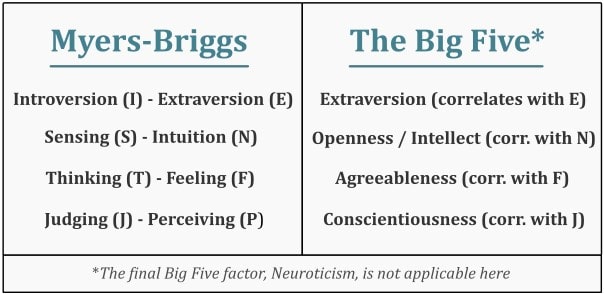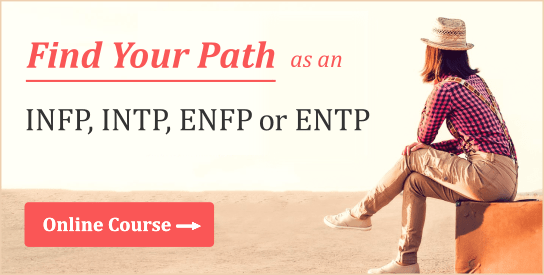
Personality enthusiasts may be prone to assume that Myers-Briggs intuition (N) is synonymous with popular conceptions of intuition, which describe the experience of knowing things without a clear understanding of how we came to know them. In his best-seller, Blink, Malcolm Gladwell cleverly coined the notion of “thinking without thinking” to capture this view of intuition.
There’s certainly a sense in which this popular understanding of intuition is appropriate and worth preserving. However it’s also true that intuition, as conceived by the Myers-Briggs, is a broader concept. More specifically, research indicates that there’s a personality dimension closely related to intuition which Big Five researchers call Intellect. In fact, many researchers have concluded that intuition and Intellect are so closely linked that they should be grouped together within a single personality domain.
In this post, we will attempt to gain a better understanding of Myers-Briggs intuition by examining it through the lens of the Big Five’s concepts of Intellect and Openness. We will also explore the ways in which intuition manifests differently in intuitive thinkers (“NT” types) versus intuitive feelers (“NF” types).
Myers-Briggs Intuition (N) & Big Five Intellect
As the name suggests, Intellect involves a penchant for intellectual activities and abstract cognition. In his paper, “Between Facets and Domains,” Big Five researcher Colin DeYoung asserts that Intellect “encompasses intellectual engagement with abstract and semantic information.”
While by no means synonymous with IQ, research has shown that Intellect is related to self-assessed intelligence, as well as working memory and fluid intelligence. This has sparked debate regarding whether Intellect might be better construed as an ability construct rather than a personality measure. At any rate, here are some questionnaire items designed to assess Intellect:
- “I am quick to understand things.”
- “I have a rich vocabulary.”
- “I enjoy philosophical discussions.”
- “I like to solve complex problems.”
DeYoung’s assertion that Intellect involves “abstract information” points us to the left side of the brain, which represents the world abstractly through words, symbols, logical constructs, theories, etc. The left hemisphere is also the brain’s language hub, which DeYoung alludes to in his association Intellect with “semantic information.”
Considering that intuition has long been viewed as a predominantly right-brained process, its association with left-brained Intellect may seem, well, counterintuitive. But this is why we allow our theories to be informed by evidence, and the evidence suggests that the intuition and Intellect are, in fact, related. This of course doesn’t mean that there won’t exceptions, but as a general rule it appears to hold true.
In addition to Intellect’s relationship to intuition, we might also expect it to correlate, to some extent, with Myers-Briggs thinking (T). We see this, for instance, in Holland’s career interest themes, where intuitive (N) thinkers (T) gravitate toward the most intellectual of Holland’s six themes—the Investigative domain. Interestingly, Myers and Briggs, who showed up well before the Big Five, seemed to grasp, at least at some level, the relationship between Intellect and intuition, as seen in the MBTI’s use of terms like “theoretical” and “conceptual” to assess the N preference. This can be seen as a strongpoint of the MBTI, since these measures help us better detect and appreciate intuition as it manifests in NT types.
Intuition & Openness
The Big Five has its own version of intuition, known by a number of names including Openness, Openness to Experience, and Openness / Intellect.

According to DeYoung, “Openness reflects engagement with perceptual and aesthetic domains, artistic interest and fantasy proneness.” Building on DeYoung’s description, it can be useful to associate Openness with the perceptual realm and Intellect with the conceptual realm. Here’s a sample of Big Five Openness items:
- “I see beauty in things that others might not notice.”
- “I daydream often.”
- “I believe in the importance of art.”
- “I have a vivid imagination.”
More so than Intellect, Openness reflects the popular view of intuition we touched on earlier, including intuition’s association with the imagination and tacit / non-verbal processing. Openness also overlaps with Elaine Aron’s work on Highly Sensitive Persons (HSP), which entails, among other things, a heightened sensitivity to beauty and appreciation of art, nature, literature, etc.
In this light, we might expect feelers (F) to generally be higher in Openness than thinkers. This is supported by research demonstrating that feelers more commonly pursue the arts and humanities.
All told, Big Five Intellect, in conjunction with Openness, gives us a comprehensive picture of the nature of intuition as portrayed in Myers-Briggs NT and NF types. Intellect reflects an insatiable appetite of the mind, while Openness betokens a hunger and sensitivity of the heart and soul.
Bridging Intellect & Openness
This brings us to our next question: If NTs exhibit more Intellect and NFs more Openness, what bridges the two concepts?
DeYoung suggests that descriptors like imaginative, original, complex, and innovative may represent points of commonality. Moreover, in his paper, “Sources of Openness / Intellect,” he describes how both Intellect and Openness are related to the pursuit of novelty and its attendant dopamine release:
Open people are permeable to new ideas and experiences; they are motivated to enlarge their experience into novel territory and to examine their experience, discovering novelty even in the previously familiar…Because increases in dopaminergic activity appear to be associated with greater responsiveness to the positive aspects of novelty, dopamine seems likely to regulate the motivational component of Openness / Intellect.
Interestingly, in the same paper, DeYoung cites dopamine as a motivating factor in Extraversion as well. If we extrapolate from this, Myers-Briggs introversion and intuition might be seen as somewhat at odds with each other, with introversion promoting safe and solitary activities, while intuition pushes for the exploration of unknown territories.
Another potential bridge between Intellect and Openness pertains to a facet of Openness called Openness to Values. According to the paper, “Six Aspects of Openness to Experience,” Openness to Values can be understood as:
The degree of a person’s susceptibility to change. People with a high degree of openness to values may reject norms and traditions….While openness to values encourages independent thinking, action, and susceptibility to change, low openness to values encourages protection of stability and security.
It seems reasonable to see NT and NF types as similar in their levels of Openness to Values, as exemplified in their propensity for change and dissatisfaction with the status quo. They also enjoy learning and experimenting with new ideas and approaches—be it intellectually, artistically, relationally, or otherwise.
Learn more about intuition (N) and the intuitive personality types in our books and online course:
Finding Your Path as an INFP, INTP, ENFP or ENTP
Related Posts:
How Intuition / Openness Works Together with Introversion & Extraversion
